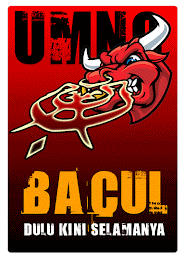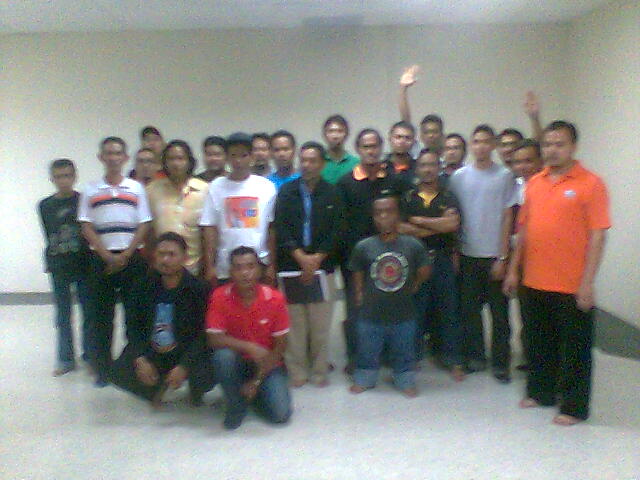PKFZ (Port Klang Free Zone) scandal is perhaps the biggest scandal the country ever had so far from the legacy of former premier Mahathir Mohamad since the BMF scandal, that’s if you ignore the Central Bank’s losses from the foreign exchange speculation. BMF (Bumiputra Malaysia Finance Ltd) scandal involved losses of about RM2.5 billion (that’s huge amount of money back in early 80s mind you) thanks to dubious loans to Hong Kong Carrian Group which collapsed in 1983 after the property crash. Carrian Group chairman George Tan (a Malaysian/Singaporean businessman), BMF chairman Lorraine Esme Osman (a longtime Tengku Razaleigh Hamzah associate) and BBMB (Bank Bumiputra Malaysia Berhad) executive director Mohd Mashim Shamsuddin were figures linked to the scandal.
Like it or not PKFZ is yet another shameful scandal although government-controlled news tried to play down the issue by using “weak project management” by PKA (Port Klang Authority) instead. Of course if the word “scandal” is used then many heads need to roll but a “weak project management” means people who were responsible for multi-billion of dollars of losses can be forgiven. Just like BMF scandal the Malaysian government was trying to cover-up the PKFZ scandal but the losses just got too huge to be swept under the carpet. And if not for the huge losses in peoples’ confidence in the current BN government as can be witnessed from the Mar 2008 general election, you must be mad to think that Najib’s administration would reveal the findings of PKFZ scandal by PricewaterhouseCoopers to the public.
Prolonging PKFZ Report to Cover-Up Politicians?
Although the report has been delayed for many months with countless of modifications made to ensure it is “in order and presentable” to the public *ahem*, a round of applause should be given to Najib’s administration although at the early stage the Transport Minister Ong Tee Kiat tried very hard to divert the attention from the scandal. Unfortunately the PKFZ scandal was simply too huge and the potential of losses is unlimited hence it’s too difficult not to scream the name of former Transport Ministers Chan Kong Choy and Ling Liong Sik. If the contents of this final report (to the public) which has been amended is shocking enough, can you imagine what would be the original report be? The good news is: the big sharks involved will get away while some small fishes may be charged but eventually their case will be thrown out due to insufficient evidence, as usual lor.
The idea to transform Port Klang into a national load center and a regional transshipment hub was mooted during Mahathir’s era in 1993 under the Seventh Malaysia Plan (1996 - 2000) after the Mahathir’s administration was impressed with Jebel Ali Free Zone in Dubai. Since its’ setup in 1985 the Jebel Ali Free Zone now spans an area of more than 12,000 acres that attracted over 6,000 tenants employing more than 130,000 employees. The Malaysian Cabinet under Mahathir approved the project in 1999 to “copy” the Jebel Ali Free Zone model and hence the birth of 405ha PKFZ (Port Klang Free Zone). But unlike UAE, Malaysia is a country whereby mega-projects always come bundle with “excessive leakages” and most probably this item was not taken into consideration *grin*.
Politicians Who Made Billions
Initially PKA (or rather “Puk Kai” Authority?) entered into several agreements with KDSB (Kuala Dimensi Sdn Bhd), a wholly-owned subsidiary of Wijaya Baru Holdings Sdn Bhd (WBHSB). Ironically WBHSB is heavily owned by several politicians from the ruling government inclusive BN backbenchers chief Tiong King Sing who owns 70% stake. KDSB made handsome gains when it bought the land for RM3 per square foot (psf) and sold it for RM25 psf to the government although the government’s valuation was only RM10 psf. With this purchase the project cost was at RM1.957 billion but subsequently escalated to RM3.522 billion as at 31 Dec 2008. Interest cost due to deferred payments to KDSB increased to RM1.425 billion resulting in a total project cost of RM4.947 billion.
The PKFZ project was doomed to fail the moment the whistle was blown mainly due to PKA which basically did nothing but to rely extremely heavily on KDSB to spoon-feed the whole project. PKA even relied solely on its quantity surveyors, QS4, to verify the costing and basically the role of PKA were, well, do almost nothing at all. To say that PKA was good for nothing is an understatement. Who are some of the board members of PKA between 2001 and 2007?
Ting Chew Peh – Pengerusi (2001 - 2003)
Abdul Rahman bin Mohd Noor – Wakil Ketua Setiausaha, Transport Ministry
Zubir bin Abdul Aziz – Wakil Ketua Pengarah, Unit Perancang Ekonomi, PM Office
Yap Pian Hon – Pengerusi (2004 - 2006)
Chor Chee Heong – Pengerusi (2007)
And many more politicians and little Napoleans
PKFZ’s 20 Major Problems
PricewaterhouseCoopers has basically outlined 20 issues with PKFZ:
Issue-1: The proposal to purchase the land was approved by the Cabinet but subsequent development proposals (2004 - 2006) which involved additional RM1.84 billion were not tabled to Cabinet for approval but were awarded to KDSB after recommendations from Minister of Transport to the Prime Minister.
Issue-2: Even though PKA knew it was not able to meet the Cabinet’s condition on self-financing, it not only did not alert the Cabinet but miraculously had the gut to sign other development agreements and thereafter the cost balloon indefinitely. Without support from somebody as powerful as a minister, you won't dare to do so, do you?
Issue-3: PKA board did not exercise adequate governance over the project implementation, another nice way to say the board did not know or simply clueless on was happening on the ground. Lots of things happened without the board’s approval or maybe the board didn’t care at all (close one eye?).
Issue-4: Advice of the Attornet General was not sought to safeguard the interests of PKA and the Government (I think it should be the taxpayers’ interests instead). Worst still, compliance such as defect liability was deliberately taken out from the agreements entered with KDSB.
Issue-5: Involvement of politicians and individuals who obviously created conflicts of interest. Chor Chee Heung, for example, was non-executive Deputy Chairman of Wijaya Baru Global Berhad (Apr’2004 – Jul’2007) and at the same time acted as Chairman of PKA (Apr’2007 – Mar’2008). In fact WBGB, KDSB, WBHSB and WBSB are all related under the umbrella of a common shareholder – Tiong King Sing.
Strangely enough, Perunding BE Sdn Bhd was appointed as PKA’s quantity surveyors when it had also acted as the quantity surveyor for KDSB as well. PKA and KDSB also shared the same legal adviser – Rashid Asari & Co.
Issue-6: Interest on the MOF soft loan will increase the project cost from RM4.947 billion to RM7.453 billion and it seemed like PKA would be almost bankrupt thereafter unless the MOF soft loan is restructured otherwise the project expenditure will balloon to RM12.453 billion. MOF soft loan of 4% per-annum over a period of 20-year will slowly but surely kill PKA of which was already being squeeze by KDSB.
Issue-7: PKA and Ministry of Transport somehow chose not to comply with MOF’s recommendation to issue government-guaranteed bonds to reduce funding cost. Obviously leakages happened when the illiterate PKA was willing to pay 7.5% per-annum charged by KDSB on deferred payments for the land purchase compared to government-guaranteed bonds coupon rates of 3.80% to 4.27%.
Issue-8: The land was purchased at value above market value. Apparently KDSB managed to convince (or rather con?) PKA that the land was worth RM25 psf because it has “special value” as if there were huge deposit of gold or oil hidden underground. Earlier JPPH valued the land at RM17 psf in Nov 1998 and RM18 psf in May 2000.
Issue-9: KDSB may have taken advantage of PKA, which didn’t really care about the project, by overcharged the latter for interest by between RM51 million to RM309 million in regards to the land purchase. The interest has been calculated using 6-monthly compounded basis instead of non-compounded yearly basis.
Issue-10: DA3, which did not contain detailed specifications and scope of work, was not a “fixed sum” contract. As a result the original estimate of RM1 billion surprisingly ballooned by 21% to RM1.216 billion. KDSB later claimed additional RM121.592 million as professional fees being 10% of the final amount of RM1.216 billion – was this figure (10%) plucked from the sky since it was not mentioned in the DA3 and PKA didn’t even question it? Thus the final development cost increased by 33% from the original estimated amount of RM1 billion to RM1.337 billion. Now, who says making money from the Malaysian Government is difficult?
Issue-11: PKA again showed its “generousity” when it allowed additional claim of RM95.256 million for general preliminaries although this cost was not specified in the DA. This was not due to stupidity on PKA but a very obvious case of leakages in broad daylight.
Issue-12: Although KDSB did not deliver three infrastructure components (monsoon drain system, water supply system and two bridges) as specified in the land purchase agreement, the final account did not include any deduction for value of work not done.
Issue-13: KDSB was awarded the RM1 billion development contract nine months before a project masterplan was finalized. Obviously someone very powerful whose status is nothing less than a minister had a hand on such decision. Your guess is as good as mine.
Issue-14: PKA may not have received value for money because it depends solely on KDSB as the turnkey developer raising the question what role is PKA playing in this project.
Issue-15: There was almost no project management and control over the project although this is a multi-billion project. It seemed the main objective was to suck up as much money as possible from the project without concern for the project deliverables.
Issue-16: Project status as at 31 Dec 2008 – except for LIU with CF, defect liability period has expired and certain defects remain to be rectified.
Issue-17: PKA has projected that it will be in cumulative cash deficit position in 2012 and will not be able to repay MOF soft loan installments thereafter. Potentially the PKFZ total project cost could skyrocket to more than RM12 billion.
Issue-18: Ministry of Transport has breached Treasury regulations because it has issued four letters of support to PKA which could be construed as a guarantee that PKA would meet its obligations on a full and timely basis. Ministry of Transport needs Ministry of Finance’s approval before issue such letters.
Issue-19: To date, PKFZ only managed to attract occupancy of only 14% which is insufficient in generating revenue to cover its operating expenses, let alone in servicing the interest costs.
Issue-20: PKFZSB is as good as bankrupt because it has incurred losses since its incorporation and has negative shareholder’s funds as at 30 Sept 2008.
So, what’s next Najib?
Sure, Ong Tee Keat (current Transport Minister) can now blow his trumpet and bull his way that the decision on PKFZ will be in people’s interest and all those craps but the fact that he tried to delay the release of the earlier version of PricewaterhouseCoopers report on PKFZ means his predecessors are involved and he’s trying to cover up for them. However this PKA is actually a one big happy family consists of politicians from the current government BN trying to scoop their “ice creams” from the taxpayer’s money. When there’s no sincerity in ensuring the project succeed but merely to suck up the leakages as much as possible, it’s a matter of time before the project get too hot and burst.
You can bet that the earlier version of the report may contains statement that indicate former MCA President and Transport Minister Ling Liong Sik issued the first letter of support on his last day as Transport Minister while the remaining three were issued by his successor Chan Kong Choy. Hence it’s not fair to display the name of Chor Chee Heung (currently deputy Finance Minister) and Taikor BN backbenchers chief Tiong King Sing but also the name of former ministers such as Ling Liong Sik and Chan Kong Choy. Just because they are no longer the minister and has retired doesn’t mean they’re immune from past involvement as far as the PKFZ scandal is concerned.
If Najib’s administration thinks that by releasing the report to the public without “fair prosecution” of those involved in the scandal the people will start sing the song of praises of him, he may as well cover this scandal. To blame the whole scandal on poor and weak management on the part of PKA is simply insulting our intelligence. You can’t screwed up and pretended nothing happens and nobody will know and keep screwing up until there’s no turning back as can be seen with the current potential RM12.453 billion of cost overrun. That’s more than six times of original cost for the project. And RM10 billion is a huge sum that can help thousands of poor citizens but I’m sure many pockets of those involved would get away free, as usual.














Tiada ulasan:
Catat Ulasan